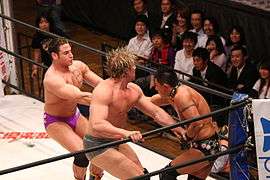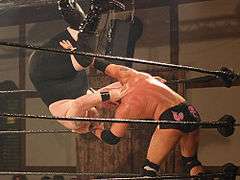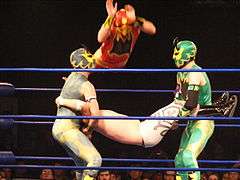Styles of wrestling
and some styles exist or have existed in more than one of these three broad categories. Where this is the case and an article exists, it may appear in and be linked to from two or more of the lists below.

The various styles of wrestling include:
- amateur sports
- professional sports, and
- sports entertainments
Note particularly that the phrase professional wrestling normally refers to a sports entertainment style, but can also refer to the professional level of wrestling as a competitive sport.[1]
Competitive wrestling
Amateur
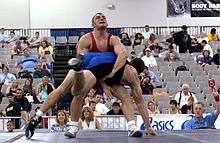
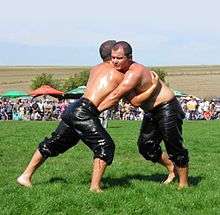
- Two styles of wrestling have been included in the modern Summer Olympics:
- Shuai jiao, covering several jacket wrestling styles of China
- Folk wrestling (see also Category:Folk wrestling styles)
- Kurash
- Kokh, Armenian type of wrestling Wrestling in Armenia
- Khuresh
- Mongolian wrestling
- Oil wrestling, the national sport of Turkey
- Schwingen in Switzerland
- Ssireum, the national sport of Korea
- Collar-and-elbow
- Cornish wrestling
- Cumberland and Westmorland wrestling
- Scottish Backhold
- Collegiate wrestling in the United States
- Sambo (martial art) in Russia
- Luta Livre in Brazil, similar to Brazilian Jiu Jitsu, but without the gi
- Amateur pankration, a modern recreation of the ancient Olympic sport
Professional
- Sumo in Japan is the most popular form of competitive wrestling at a professional level
- Lucha libre was once a competitive sport, but is now a sports entertainment
- Catch as Catch Can
Sports entertainment
The term sports entertainment was coined to describe the sports spectacles promoted by World Wrestling Entertainment (WWE).[2] These matches are not competitive, but are a scripted and rehearsed entertainment. The rules are not always clear and are generally ignored in any case.[3] The term is now used to describe all staged wrestling matches and similar versions of other sports.[4]
In the context of sports entertainment, the term professional wrestling is used both to mean all staged forms of wrestling, and also more specifically for those of the particular style developed by WWE.
- Professional wrestling mainly in the USA but also in Japan
- King's Road style in Japan
- Strong style in Japan
- Lucha Libre particularly in Mexico, but also in other Spanish-speaking countries
- Backyard wrestling originated from Hardcore Wrestling which was created by ECW
See also:
- Kayfabe, the open secret that these matches are predetermined
- Professional wrestling promotion
- List of professional wrestling promotions
- Independent circuit
- Wrestling as a sports entertainment


.jpg)
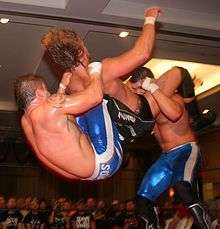

Obsolete styles
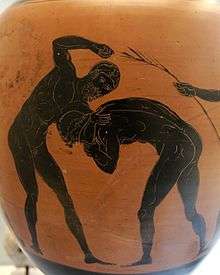
Styles no longer widely practised in amateur, professional or staged form, although some historical recreations may occur
- Pankration, mixing boxing and wrestling, and a sport in the original Olympic Games
- Greek wrestling
- Lancashire wrestling
- Devon wrestling
Techniques
- Category:Grappling hold
Organisations
- United World Wrestling, the governing body for Olympic wrestling
- WWE
- New Japan Pro Wrestling is by attendance and revenue the second largest sports entertainment organisation in the world, behind WWE
- Consejo Mundial de Lucha Libre is the world's oldest wrestling organization, specializing in the Lucha Libre style. Founded in Mexico City in 1933.
- Category:Professional wrestling promotions
People
Amateur wrestling
- Category:Sport wrestlers
- Category:Cornish Wrestling Champions
- Category:Wrestling coaches
Competitive professional wrestling
- Category:Sumo people
Sports entertainment
- Jess McMahon and Toots Mondt, co-founders of WWE
- Category:Professional wrestlers
See also
- Boxing styles and technique
- Comparison of karate styles
- Comparison of kobudō styles
- Hybrid martial arts
- Styles of Chinese martial arts
- Styles of Japanese martial arts
References
- See Wiktionary
- http://www.wrestlezone.com/news/487839-stephanie-mcmahon-talks-connors-cure retrieved October 18, 2014
- http://whatculture.com/wwe/10-oddest-rules-wrestling.php retrieved October 18, 2014
- For example roller derby, see history of roller derby
External links
| Look up sports entertainment or professional wrestling in Wiktionary, the free dictionary. |
